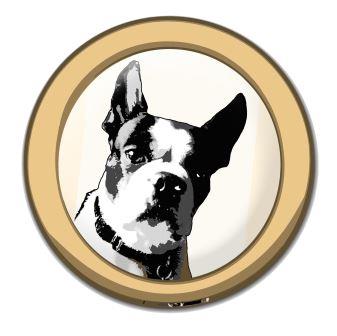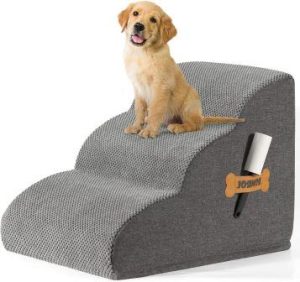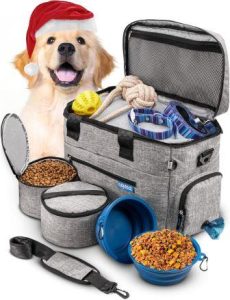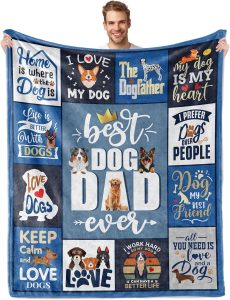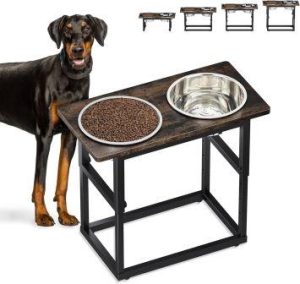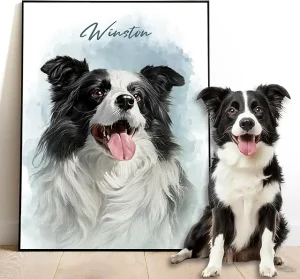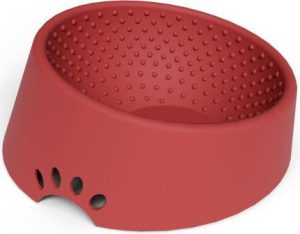Welcome to our informative article on whether dogs can eat cat food. Many pet owners often wonder if it’s alright to feed their beloved canine companions a taste of feline cuisine. In this section, we will delve into this topic and explore the potential implications and considerations when it comes to dogs consuming cat food.
Key Takeaways:
- Feeding your dog cat food may not be safe and suitable for their dietary needs.
- There are nutritional differences between dog and cat food that must be taken into account.
- Dogs consuming cat food can potentially experience harmful effects on their health.
- It’s important to prioritize proper nutrition for dogs to support their overall well-being.
- There are alternative food options that are safer and more suitable for dogs.
Dogs vs. Cat Food: What’s the Difference?
When it comes to feeding our furry friends, understanding the nutritional differences between dog and cat food is crucial. While dogs and cats may share certain dietary requirements, their nutritional needs are distinct. This raises the question: can dogs safely consume cat food?
To answer this query, let’s take a closer look at the disparities between the two types of pet food.
Nutritional Variations
Dog Food:
Dog food is specifically formulated to meet the dietary needs of dogs. It typically contains a balanced combination of protein, carbohydrates, fats, vitamins, and minerals necessary for optimal health and development. The protein in dog food is sourced primarily from meat, providing essential amino acids that support muscle growth and maintenance.
Cat Food:
Cat food, on the other hand, is specially designed to cater to the needs of feline companions. It contains higher levels of protein and fat compared to dog food, reflecting the natural carnivorous diet of cats. Additionally, cat food contains certain nutrients, such as taurine, that are essential for cats but not required in the same quantities for dogs.
While dogs and cats have some overlapping nutritional requirements, the differences in protein and nutrient ratios between dog and cat food make them distinct in terms of their suitability for each species.
The Safety of Dog Eating Cat Food
So, is it safe for a dog to eat cat food?
While occasional consumption of cat food by a dog may not cause immediate harm, it is generally advised against. Regular or excessive ingestion of cat food can lead to nutritional imbalances and potential health issues in the long run.
One of the main concerns is that cat food tends to be higher in calorie content and protein levels than what dogs need on a daily basis. Over time, this can lead to weight gain and nutritional excesses, posing risks to a dog’s overall health and well-being.
Moreover, cat food lacks certain essential nutrients required specifically by dogs, such as specific vitamins and minerals like vitamin K and vitamin E, which are important for optimal canine health.
| Key Differences Between Dog Food and Cat Food | Dog Food | Cat Food |
|---|---|---|
| Protein Content | Optimized for canine needs | Higher levels tailored to feline needs |
| Fat Content | Moderate levels | Elevated levels to support feline metabolism |
| Carbohydrates | Generally higher | Lower, as cats have a limited ability to metabolize carbohydrates |
| Nutrient Composition | Tailored for canines, including specific vitamins and minerals | Cat-specific nutrients like taurine and arachidonic acid |
As evident from the table, these key differences highlight the unique nutritional needs of dogs and cats, underscoring the importance of providing them with appropriate food.
In the forthcoming sections, we will discuss the potential harmful effects of dogs eating cat food and explore alternative food options that are safe and suitable for dogs. It is crucial to prioritize the health and well-being of our beloved canines by ensuring they receive a well-balanced diet tailored to their specific needs.
Potential Harmful Effects of Dogs Eating Cat Food
Dogs ingesting cat food can lead to various harmful effects on their health. It’s crucial for dog owners to be aware of these potential risks and take steps to prevent their furry companions from consuming cat food.
Gastrointestinal Disturbances
The primary concern when dogs eat cat food is the difference in their nutritional needs and digestion. Cat food is formulated to meet the specific dietary requirements of felines, which can be detrimental to dogs. The higher protein content and different nutrient balance in cat food can cause gastrointestinal disturbances such as upset stomach, diarrhea, and vomiting in dogs.
Obesity and Weight Gain
Another potential harmful effect of dogs eating cat food is the risk of obesity and weight gain. Cat food is often higher in calories and fat compared to dog food. Dogs that regularly consume cat food can exceed their daily calorie requirements and gain excess weight, which can lead to a range of health issues, including joint problems and heart disease.
Nutritional Imbalances
Dogs require specific nutrients in their diet to support their growth, development, and overall well-being. Cat food, on the other hand, is formulated to meet the unique nutritional needs of cats. When dogs eat cat food on a regular basis, they may not receive the proper balance of essential nutrients like vitamins, minerals, and fatty acids that are necessary for their optimal health. This can result in nutritional deficiencies and associated health problems.
Allergies and Food Sensitivities
Dogs may have allergies or food sensitivities, and cat food ingredients can trigger adverse reactions in some dogs. Certain proteins and fillers commonly found in cat food, such as fish or grains, can cause allergic reactions in dogs with sensitivities. These allergies can manifest as itching, skin irritations, ear infections, and gastrointestinal issues.
In summary, while dogs may be curious about cat food, it’s best to prevent them from consuming it on a regular basis. The potential harmful effects of dogs eating cat food include gastrointestinal disturbances, obesity, nutritional imbalances, and allergies. Providing dogs with a balanced diet formulated specifically for their nutritional needs is essential for maintaining their health and well-being.
Can Dogs Have Cat Food?
When it comes to the age-old debate of whether dogs can indulge in a little feline cuisine, the answer isn’t a simple yes or no. While dogs can technically consume cat food, it’s important to understand the factors that determine its suitability for our canine companions.
First and foremost, it’s essential to note that cat food is specifically formulated to meet the nutritional needs of cats, not dogs. Cats require higher levels of protein, fatty acids, and certain vitamins and minerals that may not be present or balanced appropriately for dogs in cat food.
One of the key differences between cat and dog food lies in the protein sources. Cats are obligate carnivores, meaning they require a diet primarily consisting of meat. On the other hand, dogs are omnivores and have a more flexible diet that includes both meat and plant-based ingredients.
While occasional nibbles of cat food may not pose an immediate threat to your dog’s health, consistently feeding them cat food can lead to imbalances and deficiencies over time. These imbalances can result in malnutrition and various health issues.
Here are some important considerations to keep in mind when it comes to dogs and cat food:
- Nutritional Imbalance: Cat food typically contains higher levels of protein and fat, which can strain a dog’s kidneys and lead to weight gain if consumed regularly.
- Taurine Deficiency: Cats require taurine, an amino acid found in animal tissues, for proper heart and eye health. While dog food is typically formulated with adequate levels of taurine, cat food may not provide the same level of this essential nutrient for dogs.
- Vitamin and Mineral Differences: Dog and cat food formulations differ in the levels and types of vitamins and minerals. What may be sufficient for a cat’s overall health may not meet a dog’s requirements.
To ensure your dog’s nutritional needs are met, it is best to opt for a high-quality dog food that is specifically formulated for their species. A balanced and complete diet tailored to your furry friend will help promote their overall health and well-being.
| Factors | Dog Food | Cat Food |
|---|---|---|
| Protein Content | Varies depending on the brand and formula, but typically lower than cat food | Higher protein content to meet the needs of obligate carnivores |
| Taurine Levels | Typically adequate for dogs | Generally higher to support heart and eye health in cats |
| Additional Nutrients | Formulated to meet the specific requirements of dogs | May contain additional nutrients tailored to cats, which may not be suitable or necessary for dogs |
Ultimately, while dogs can technically have cat food on occasion without immediate harm, it is best to stick to a balanced and appropriate diet specifically formulated for dogs. Consulting with your veterinarian can provide valuable guidance on the best dietary choices for your furry companion.
Importance of Proper Nutrition for Dogs
Proper nutrition plays a vital role in maintaining the overall health and well-being of our furry companions. As dog owners, it is essential for us to provide our dogs with a balanced diet that fulfills their nutritional requirements. While cats and dogs share some dietary similarities, it’s important to understand the specific nutritional needs of dogs in order to keep them healthy and thriving.
Dogs require a diet that is rich in essential nutrients such as protein, carbohydrates, fats, vitamins, and minerals. These nutrients support various bodily functions, including muscle development, energy production, immune system function, and overall growth. Providing a balanced diet that meets these nutritional needs is key to ensuring our dogs have the energy, stamina, and longevity they need to lead happy and active lives.
Unlike cats, which are obligate carnivores, dogs are omnivores and can derive nutrients from both animal and plant-based sources. This gives us a wider range of options when it comes to selecting dog food. However, it’s important to choose dog food that is specifically formulated to meet their nutritional needs.
“Proper nutrition is the foundation of a healthy and happy dog.”
The key elements of a balanced diet for dogs include:
- Protein: Dogs require high-quality protein sources such as meat, fish, and poultry to support muscle development and maintenance.
- Carbohydrates: Complex carbohydrates like whole grains and vegetables provide dogs with energy and fiber needed for proper digestion.
- Fats: Healthy fats from sources like fish oil or chicken fat help with nutrient absorption and promote healthy skin and coat.
- Vitamins and Minerals: Dogs need a blend of vitamins and minerals for various functions in their bodies, including bone health, immune system support, and cellular function.
Feeding our dogs a diet that meets these nutritional requirements is crucial, as it can help prevent deficiencies and potential health issues. It’s important to consult with a veterinarian to determine the specific nutritional needs of your dog based on factors such as age, breed, size, and activity level.
By providing our dogs with a balanced and nutritious diet, we can ensure they have the foundation for a healthy and active life. Let’s prioritize their nutritional needs and make informed choices when it comes to their diet.
| Nutrient | Sources | Benefits |
|---|---|---|
| Protein | Meat, fish, poultry | Supports muscle development and maintenance |
| Carbohydrates | Whole grains, vegetables | Provides energy and fiber for digestion |
| Fats | Fish oil, chicken fat | Aids nutrient absorption and promotes healthy skin and coat |
| Vitamins and Minerals | Fruits, vegetables, fortified foods | Supports bone health, immune system, and cellular function |
Alternatives to Cat Food for Dogs
When it comes to feeding your dog, it’s important to provide them with a diet that meets their specific needs. While cat food may not be the best option for dogs due to nutritional differences, there are plenty of dog-friendly alternatives to consider. These alternatives can ensure that your furry friend receives the necessary nutrients while keeping them happy and healthy.
1. High-Quality Dog Food
One of the simplest alternatives to cat food for dogs is to choose a high-quality dog food that is specifically formulated to meet their nutritional needs. Look for dog food brands that prioritize real meat as the main ingredient and avoid artificial additives or fillers. This will provide your canine companion with a well-balanced and nutritious diet.
2. Homemade Dog Meals
If you prefer a more hands-on approach, you can prepare homemade meals for your dog using dog-friendly ingredients. This allows you to have control over the quality and variety of ingredients used. Include lean proteins, such as chicken or turkey, along with carbohydrates like sweet potatoes or brown rice. Don’t forget to add some vegetables for added nutrition.
TIP: When preparing homemade dog meals, it’s important to consult with a veterinarian or a canine nutritionist to ensure that the meals are properly balanced and meet your dog’s specific dietary requirements.
3. Commercial Dog Treats
If you’re looking to provide your dog with a treat or snack, opt for dog-specific treats instead of cat treats. There are plenty of dog-friendly treats available in pet stores or online that are designed to meet the nutritional needs of dogs. Look for treats made with natural ingredients and avoid those with excessive fillers or artificial additives.
4. Fresh Fruits and Vegetables
In addition to their regular meals, you can incorporate fresh fruits and vegetables into your dog’s diet as healthy snacks. Many fruits and vegetables are safe and beneficial for dogs, providing essential vitamins and minerals. Some dog-friendly options include apples, carrots, and green beans. Remember to consult with your veterinarian regarding portion sizes and any potential dietary restrictions for your specific dog breed.
5. Supplements
If you’re concerned about your dog’s overall nutrition, you can consider adding supplements to their diet. However, it’s important to consult with your veterinarian before introducing any new supplements to ensure they are safe and appropriate for your dog.
In conclusion, while cat food may not be the best option for dogs, there are plenty of alternatives that can provide them with the necessary nutrients. Choosing high-quality dog food, preparing homemade meals, opting for dog-specific treats, incorporating fresh fruits and vegetables, and considering supplements are all viable options to ensure your furry friend gets the nutrition they need. Remember, the key is to provide a balanced diet tailored to your dog’s specific needs and consult with your veterinarian to ensure their dietary requirements are met.
Tips for Managing Dogs and Cats in the Same Household
In households where both dogs and cats reside, it’s important to manage their separate dietary needs to ensure the health and well-being of both pets. Here are some tips to help you navigate mealtime management and prevent any cross-consumption of pet food.
- Create designated feeding areas: Set up separate eating spaces for your dogs and cats to avoid accidental sharing of food. This can be as simple as placing their bowls in different areas of the house.
- Establish consistent feeding schedules: Feed your dogs and cats at different times to minimize the chances of them being in the feeding area together. This will help prevent any temptation or attempts to access each other’s food.
- Supervise mealtime: Keep an eye on your pets during their meals to ensure they stay in their designated areas. If necessary, use barriers or gates to separate them during feeding time.
- Store pet food securely: Store dog and cat food in separate containers or cabinets to prevent accidental access and consumption by the wrong pet. Make sure the containers are sealed tightly to maintain freshness.
- Monitor food intake: Keep track of how much your dogs and cats eat to ensure they are receiving appropriate portions and not consuming each other’s food.
- Consider specialized diets: If one of your pets has specific dietary requirements, such as allergies or medical conditions, consult with your veterinarian to determine the best approach for managing both pets’ nutritional needs in a multi-pet household.
By implementing these tips, you can ensure that your dogs and cats coexist harmoniously while maintaining their distinct dietary regimens.
Conclusion
In conclusion, we’ve explored the question of whether dogs can eat cat food. While it is technically possible for dogs to consume cat food, it is generally not recommended. The nutritional differences between dog and cat food can have potential implications for your dog’s health and well-being.
Ensuring that your dog receives a balanced diet tailored to their specific needs is crucial. Dog food is formulated to provide the essential nutrients and vitamins that dogs require for optimal health. Feeding your dog a diet designed specifically for them can help prevent nutritional deficiencies and potential digestive problems.
While it may be tempting to offer your dog cat food as a treat or due to convenience, it’s important to prioritize their long-term health. Cat food, which is formulated to meet the unique nutritional needs of cats, may not provide the necessary nutrients that dogs require to thrive.
By providing your dog with a high-quality dog food that meets their dietary needs, you can help ensure that they maintain a healthy weight, have strong muscles and bones, and have a well-functioning immune system. Consult with your veterinarian to determine the best diet for your dog and make adjustments as needed in order to support their overall health and well-being.
FAQ
Can a dog eat cat food?
While it is technically possible for a dog to eat cat food, it is generally not recommended. Cat food is formulated to meet the specific nutritional needs of cats, which differ from those of dogs. Feeding your dog cat food on a regular basis can lead to imbalances in their diet, potentially causing health issues in the long run.
What’s the difference between dog food and cat food?
Dog food and cat food are specifically formulated to meet the nutritional requirements of each species. Dogs require higher levels of certain nutrients, such as protein, while cats need more fat and certain amino acids. Cat food also contains ingredients that are harmful or unnecessary for dogs, such as higher levels of taurine. Therefore, it is important to feed your dog a diet designed for their specific needs.
Are there any harmful effects of dogs eating cat food?
Yes, there can be harmful effects of dogs eating cat food. Since cat food is formulated differently, it can lead to nutritional imbalances in dogs if consumed regularly. This can result in obesity, digestive issues, and deficiencies in essential nutrients. In some cases, cat food can also contain ingredients that are toxic to dogs, such as onions or garlic. It is best to avoid feeding cat food to dogs to prevent these potential problems.
Can dogs have cat food in moderation?
While occasional consumption of small amounts of cat food may not immediately harm a dog, it is still not recommended. Dogs should ideally stick to a balanced diet that meets their specific nutritional needs. Feeding them cat food, even in moderation, can disrupt their diet and lead to potential health issues in the long run. It is best to consult with your veterinarian for appropriate dietary recommendations for your dog.
Why is proper nutrition important for dogs?
Proper nutrition is crucial for dogs to maintain their overall health and well-being. Dogs have specific dietary requirements, including the right balance of proteins, carbohydrates, fats, vitamins, and minerals. Providing them with a balanced diet supports their immune system, promotes healthy digestion, aids in weight management, and helps maintain strong muscles and bones. It is important to prioritize your dog’s nutritional needs to ensure their optimal health.
Are there any alternatives to cat food for dogs?
Yes, there are safe and suitable alternatives to cat food for dogs. Commercially available dog food is specifically formulated to meet their nutritional needs and is the best choice for their overall well-being. You can also prepare homemade meals using dog-friendly ingredients under the guidance of a veterinarian. It is important to ensure that any alternate food options provide the necessary nutrients and do not pose any harm to your dog.
How can I manage dogs and cats in the same household with different dietary needs?
When you have both dogs and cats in the same household, it is essential to manage their separate dietary needs. Feed them in separate areas of the house or at different times to avoid any chance of cross-consumption. Additionally, keep their food securely stored and out of reach from each other. If you have any concerns or need further guidance, consult with your veterinarian for personalized advice based on your pets’ specific needs.
